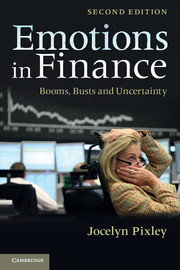Book contents
- Frontmatter
- Contents
- Acknowledgements
- Abbreviations
- Interviews
- Introduction
- 1 Modern money, modern conflicts
- 2 Corporate suspicion in the kingdom of rationality
- 3 Financial press as trust agencies
- 4 Required distrust and the onus of a bonus
- 5 Managing credibility in central banks
- 6 Hierarchies of distrust from trust to bust
- 7 Overwhelmed by numbers
- 8 The time-utopia in finance
- 9 Taming the god of opportunism
- References
- Index
4 - Required distrust and the onus of a bonus
Published online by Cambridge University Press: 05 June 2012
- Frontmatter
- Contents
- Acknowledgements
- Abbreviations
- Interviews
- Introduction
- 1 Modern money, modern conflicts
- 2 Corporate suspicion in the kingdom of rationality
- 3 Financial press as trust agencies
- 4 Required distrust and the onus of a bonus
- 5 Managing credibility in central banks
- 6 Hierarchies of distrust from trust to bust
- 7 Overwhelmed by numbers
- 8 The time-utopia in finance
- 9 Taming the god of opportunism
- References
- Index
Summary
Decisions are always made under uncertainty about outcomes. If success and failure stirs every bank every day, the rules repress uncertainty in public until another bust. This is silly, because it's inevitable that some decisions can go wrong. Confidence is better tempered by modesty. Humour would be in order, were it not for the selling machine. No one will bet on horses if the bookie says they're all dogs. The wobbly corporate edifice is not understood by examining innate psychological features, I show. That cannot explain how the entire financial world defines a boom not as such, but as a situation of certainty, and only a bust is one of uncertainty. The same banks et al., staffed by the same officials with the same old personalities play parts in booms and busts, more so given today's turnaround is three years each boom. Some firms vanish, officials are replaceable, but all use much the same patchy techniques to try to cope with or evade the spectre of bad outcomes.
This chapter demonstrates instability has nothing to do with personal temperaments or crowds. The financial sector is inherently unstable; its 400 years of seeking profits is a history of successes and failures. Corporate incentive structures, Standard Operating Procedures (SOPs), cognitive rules and emotion-rules, remits, laws and democratic constraints, which vary, are not created by greedy persons. Specific traits do not produce booms or busts. In some financial centres, the ‘onus of a bonus’ is to find more dubious financial innovations that create the next boom. Everyone is frantic until another nirvana – short-lived. There is a stonewalling against the idea that officials work under emotion-rules of trust, distrust, towards every other part of finance, in requisite ways to face the future. These rules are impersonal now, and the position of office requires emotion and cognitive rules. My interviews with senior personnel show this social nature is far removed from psychology, and how officials in central banks decide under different emotion-rules than in banks and so on.
- Type
- Chapter
- Information
- Emotions in FinanceBooms, Busts and Uncertainty, pp. 103 - 135Publisher: Cambridge University PressPrint publication year: 2012



